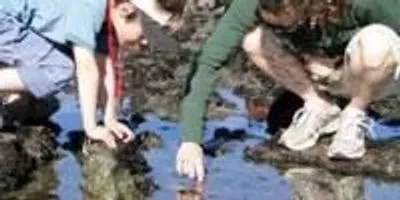“Yet natural history provides essential knowledge for fields as varied as human health, food security, conservation, land management and recreation,” he said.
Tewksbury and 16 other scientists from across North America outline the importance to society and call for a revitalization of the practice of natural history in an article in the April issue of BioScience.
 A natural historian’s field work sketches.Photo courtesy of K RowellNatural history is generally more concerned with observations and collections than with experimentation. It’s thought narrowly as the purview of scientists bottling up specimens or pressing plants meant for museums. But natural history is really about looking at organisms so closely that one learns their habits and how they fit with what’s around them. The approach works for understanding animals, plants and other organisms outdoors as well as at the microbial level in, for example, our bodies.
A natural historian’s field work sketches.Photo courtesy of K RowellNatural history is generally more concerned with observations and collections than with experimentation. It’s thought narrowly as the purview of scientists bottling up specimens or pressing plants meant for museums. But natural history is really about looking at organisms so closely that one learns their habits and how they fit with what’s around them. The approach works for understanding animals, plants and other organisms outdoors as well as at the microbial level in, for example, our bodies.
Among examples in the paper, the co-authors point out that effective fisheries management relies on natural history and that disasters such as the collapse of the Bering Sea walleye pollock fishery might have been avoided had natural history been used sooner. Many infectious diseases of humans – including avian influenza, Lyme disease, cholera and rabies – are linked at some point in their life cycles to other animals. Indeed 75 percent of emerging infectious diseases are associated with animals. Control strategies rely on knowing these hosts’ natural history.
Increasingly sophisticated biological models still need observations from the real world, the authors point out.
“Despite the importance of detailed natural history information to many sectors of society, exposure and training in traditional forms of natural history have not kept pace with growth in the natural sciences over the past 50 years,” they write.
Whereas universities in the 1950s, examined as part of the BioScience paper, required natural history courses for a biology degree, today the majority of U.S. schools have no such requirement, a trend that has coincided with the rise of molecular, experimental and other forms of biology. The rate of natural history publications in some disciplines has seen a parallel decline.
“You see collections being abandoned or consolidated,” said Kirsten Rowell, a UW acting assistant professor, curator of malacology (shells) at the UW’s Burke Museum of Natural History and Culture and a co-author on the paper. “People are being skirted around natural history. Graduate students were told natural history projects were not something valuable to science as a whole.”
 Children are natural citizen scientists, one youngster works here with Kirsten Rowell in tide pools on the California Coast.Photo courtesy of the University of WashingtonIn the paper the co-authors offer recommendations for individuals and institutions interested in revitalizing natural history.
Children are natural citizen scientists, one youngster works here with Kirsten Rowell in tide pools on the California Coast.Photo courtesy of the University of WashingtonIn the paper the co-authors offer recommendations for individuals and institutions interested in revitalizing natural history.
“There’s hope, both within and outside of traditional natural history collections, in the rise of Internet- and smartphone-based technologies that allow the growth of broad partnerships, including citizen-science initiatives,” Tewksbury said. An example is eBird, a web-based program developed by the Cornell Lab of Ornithology that has capitalized on the widespread interest in and appeal of birds. The program has witnessed a rapid, global increase in data contributors and users, which has enabled both researchers and the general public to benefit from technologies for the collection, organization and dissemination of vast numbers of bird observations.
Such programs are emerging but will need established professionals to self-identify as natural historians to provide the leadership for natural history to reclaim its necessary role, the authors assert.
The paper, a website and other materials emerged following a series of four workshops funded by the National Science Foundation and the UW College of the Environment.
Other co-authors from the UW are Jonathan Bakker, Timothy Billo, Peter Dunwiddie, Martha Groom, Noelle Machnicki and Liam Stacey; and from other institutions are John Anderson with the College of the Atlantic, Maine; Stephanie Hampton, University of California, Santa Barbara; Steven Herman with Evergreen State College; Douglas Levey with NSF; Carlos Martinez Del Rio with the University of Wyoming; Mary Power with University of California, Berkeley; Anne Salomon with Simon Fraser University; Stephen Trombulak with Middlebury College, Vermont; and Terry Wheeler with McGill University, Quebec.















